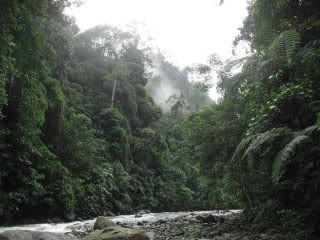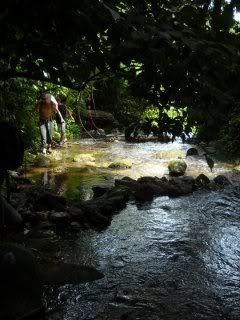When I stepped into Gunung Leuser National Park in Bukit Lawang, Northern Sumatra, the countless shades of green struck me immediately. Seduced and amazed by this colour’s endless gradations, I almost forgot where I was, walking in the jungle and surrounded by ancient trees stretching up to the sky and filtering the light coming in from above. Then, I looked up and there it was: the rainforest imposing its majestic presence on me. Roots coming out of the soil created paths, built stairs and slopes in their brutal embrace with the outside world; roots rising out of the ground climbed up trees and formed swings, adding movement to the background. I slowed down my pace and there was nothing but the jungle and me; just the trees and my squishy steps on the ground, sun rays penetrating the heavy vegetation created light and shaded me from the harsh sun, with the orchestra of nature as soundtrack. I heard the monkeys screeched and birds of myriad sizes and colours sang, I felt the stare of reddish hairy creatures and I could see them silently watching me from their nests in the trees. I got distracted by huge butterflies flying around and I came across a river, where water buffaloes were bathing, their nose half beneath the water. Once again, I noticed the shades of green, incredibly bright after the rain, and then the mangroves, the roots and the flowers. Now I could see the clouds and, finally, a bit of sky too.

The Gunung Leuser National Park is one of the few places left in the world where it is still possible to see the orangutans and other endangered species in their natural habitat. The orangutans in particular, once widespread throughout the forests of Asia, are now confined to just two islands, Sumatra and Borneo.
“When I was a child there were many wild orangutans around the area where I lived. Since then, a lot of rainforest has been converted into oil palm plantations and orangutans or wild pigs cannot live there anymore.” Poli lamented. Poli is from a small village in North Sumatra located about 4 hours from the Orangutans Conservation Centre. He runs the Balinese branch of the Sumatran Orangutans Society (S.O.S), based at the S.O.S. Jungle shop in Ubud, Bali, together with Widi, a Balinese responsible for the shop and Alison, an American intern. I just got back from the jungle in Sumatra and I am eager to know more about this organisation involved in the protection of the peaceful creatures I had the rare opportunity seeing them make their way gracefully through the trees in Bukit Lawang.
The shop in Ubud is an important source of funds for the S.O.S. A tree is planted for every purchase and part of the amount is used to support the organisation’s activities. What is more, the Jungle Shop is the S.O.S. headquarters outside Sumatra, where Poli and his colleagues carry out campaigns and educational programs in collaboration with some international schools based in Bali and with the Alam Kul Kul hotel, where informative sessions are held once a week. In Sumatra the S.O.S., in collaboration with the Orangutan Information Centre (OIC), mainly works to raise awareness among locals and tourists about the jungle and to preserve its natural habitat, promoting the orangutan as an ambassador for the rainforest. In Sumatra, besides the orangutan, there are other endangered endemic species such as the Sumatran tiger, rhino and elephant. “Today, in Sumatra there are only 450 tigers. But the tiger is not receiving as big an attention as the orangutans because the orangutans are the ones in charge of keeping the balance of the forest. They’re the ones maintaining the entire ecosystem of the forest, but we still need the tigers! As we need the elephants and the rhinos.” Poli said.

A network of “conservation villages” has been created in the area around the OIC. They serve as models of conservation-oriented living by promoting environmental education and habitat protection, whilst supporting the development of sustainable livelihoods. S.O.S. runs training classes for rangers and locals and funds reforestation and eco-tourism projects aimed at generating an alternative income for local communities. In fact, eco-tourism contributes in the protection of orangutans and other endangered species and represents a sustainable way to meet local development goals.
Poli strongly believes it is essential to develop common awareness in order to protect the rainforest and its inhabitants in the long-term. “The main aim of our activities in Bali,” he explained, “is to educate students about the situation of the rainforest in Indonesia, the country they live in.”
The forest’s strength and importance is greatly felt when one sees, touches and smells it. Personally experiencing the jungle surely triggers a feeling of protection towards its flora and fauna, especially if one is aware that it is in danger. This is why I was not impressed when Poli told me that students were much more involved in the activities of the S.O.S. when they got back from summer camp at Gunung Leuser National Park after one year of environmental education classes. The course introduced them to environmental issues such as deforestation, endangered species and they learnt about the importance of various animals for the conservation of the ecosystem in one of the last remaining forests on the planet. However, their stay in the rainforest was critical and it is what really made a difference in the students’ approach and pushed them to take action once they returned home.
Individual awareness is the driving force behind the slow transition towards a sustainable future for the rainforests and its inhabitants. From critical consumption to moderate use of energy in everyday life, Poli added, it is not difficult to fuel this machine. Silent activism, made through informed choices, is immensely effective. What keeps the flame burning is the energy of the jungle, its powerful strength that both the students and I felt when we visited the rainforest in Bukit Lawang. However, Poli’s motivation is rooted more deeply: “For me this is not a job; for me this is working to fix my own island. I am from there and for me this is not getting paid to do it, this is battling with bad things in my home land. This is my home, I have to fix it, I have to restore it back to the origins. That’s it.”
Published on WildAsia.org

Hi! Someone in my Myspace group shared this website with us so I came to check
it out. I’m definitely enjoying the information. I’m book-marking and will be tweeting this to my followers!
Superb blog and brilliant style and design.
Do you mind if I quote a few of the posts so long as
I provide credit and sources straight back to your weblog?
My blog is with the very same area of interest as yours and my visitors would certainly make use of the vast majority of information you provide
here. Please inform me if the alright along with you. Many thanks!
Sure you can quote this blog and all its content as long as you credit name and sources [margeye.com]. it would be great if you could send me the link once published. thank you